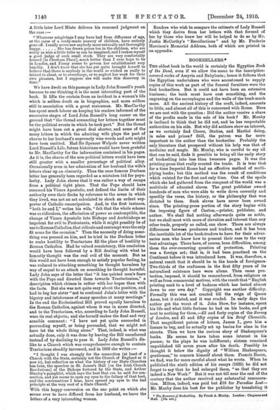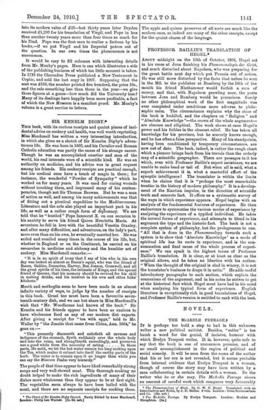BOOR - SELLERS.*
THE oldest book in the world is certainly the Egyptian Boole of the Dead, even if we allow the name to the inscription- covered rocks of Assyria and Babylonia ; hence it follows that the Egyptian undertakers who were accustomed to supply copies of this work as part of the funeral furniture were the first booksellers. But it could not have been an extensive business ; the book must have cost something, and the engraving on the sarcophagus and the walls of the tomb much more. All the ancient history of the craft, indeed, amounts to little, and almost all of this is concerned with Rome. Here we are met with the question : Did the author receive a share of the profits made in the sale of his book P Mr. Munby is inclined to think that he did not, and he has respectable authorities on his side. But why did authors show an interest, as we certainly find Cicero, Statius, and Martial doing, in sales and prices P Still, the patron was far more important to the author than the bookseller. Probably the only literature that prospered without his help was that of medicine and magic. Mr. Munby, who is careful to say all that can be said, finds it possible to bring all the early story of bookselling into less than twoscore pages. It was the printing-press that really created the trade. It is true that for a time Imperial Rome bad an effective method of multi- plying books; but this method was the result of conditions which existed for the first and only time. One of the spoils which she had gathered from the conquest of the world was a multitude of educated slaves. The great publisher owned hundreds of men who were able to write down correctly and speedily the verse, the history, or the philosophy that was dictated to them. Such slaves have never been owned since. The printing-press portion of the story begins with the imposing figure of Caxton,—printer, publisher, and author. We shall find nothing afterwards quite as noble, but we shall meet with more of elevation and interest than any other trade, properly so called, can show. There are always differences between producers and traders, and it has been the inevitable lot of the book-traders to have for their adver- saries men who know how to present their case to the very best advantage. There have, of course, been difficulties, among them the ever-recurring question of protection. Printing was a foreign art; that is, it had been practised on the Continent before it was introduced here. It was, therefore, a natural result that it should be in the hands of foreigners. Two-thirds of the craftsmen in the first fifty years of its naturalised existence here were aliens. Then came pro- tection, imposed, it should be remembered, from religious as well as from commercial motives, with the result that " English printing sank to a level of badness which has lasted almost down to our own day." Copyright was another difficulty. Formally this was not created till the reign of Queen Anne, but it existed, and it was evaded. In early days the author got the worst of it. John Stow, for instance, spent his life and what little fortune he had on his books, and got next to nothing for them,-23 and forty copies of the Survey of London, and £1 and fifty copies of his Brief Chronicle. That magnificent patron of letters, James I., gave him a license to beg, and he actually set up basins for alms in the streets. Then we have the curious story of Shakespeare's books. He seems to have taken some interest in his poems ; to the plays he was indifferent; sixteen remained unpublished till seven years after his death. Possibly he thought it below the dignity of "William Shakespeare, gentleman," to concern himself about them. Francis Bacon, we find, was far more careful about what he wrote. When he published the ninth edition of his essays (1625) he did not forget to say that he had enlarged them, " so that they are indeed a New Work." But it was not till near the end of the century that the author received any substantial remunera- tion. Milton, indeed, was paid but £10 for Paradise Lost— Mr. Munby does his best for the publisher by translating it
•
The Ecotone') of Bookselling. By Frank A. Munby. London: Chapman and Hall. [1ka. net.] into its modern value of £35—but thirty years later Dryden received £1,200 for his translation of Virgil, and Pope in less than another twenty years more than four times as much for his Iliad. Pope was the first man to realise a fortune by his books,—if we put Virgil and his Imperial patron out of the question. In our own times the phenomenon is not uncommon.
It would be easy to fill columns with interesting details from Mr. Munby's pages. Here is one which illustrates a side of the publishing business of which too little account is taken. In 1716 the Clarendon Press published a New Testament in Coptic, and sold the last copy in 1907. Supposing that the cost was £150, the number printed five hundred, the price 10s., and the sale something less than three in the year—we give these figures at a guess—how much did the University lose ? Many of its dealings have happily been more profitable, a fact of which the New Museum is a manifest proof. Mr. Munby's volume is a great service to letters.







































 Previous page
Previous page